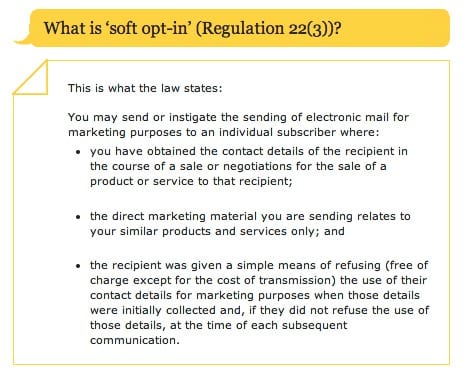A recent court case could set a legal precedent to limit behavioural email marketing
Importance (to retail email marketers): [rating=5]
Recommended link: Sky News: Spammer To Pay Damages After Court Victory
There has recently been an interesting, useful and somewhat scary discussion on the Smart Insights LinkedIn discussion group about the risks of email marketers being seen as spammers and action take against them. Worth checking out if you’re involved in email marketing.
It alerted me to this recent case where John Lewis has had to pay damages because of their email marketing and data privacy opt-in approach on their site. I’ve created an alert on it since the finding seems to suggest the common practice of pre-ticking a box during purchase and following that up with an “Abandoned Shopping cart email”
The case was brought against the retailer by Roddy Mansfield, a Sky news producer. It was a private action and the finding was in a county court.
He had registered his details with John Lewis’ website, a process which includes a pre-ticked box consenting to marketing emails.
It looks to me as if John Lewis were following the soft opt-in guidance from the ICO in line with the UK Privacy and Electronic Communications (EC Directive) Regulations 2003. PECR states in Regulation 22 (3) that
"(3) A person may send or instigate the sending of electronic mail for the purposes of direct marketing where—
(a) that person has obtained the contact details of the recipient of that electronic mail in the course of the sale or negotiations for the sale of a product or service to that recipient;
(b) the direct marketing is in respect of that person’s similar products and services only; and
(c) the recipient has been given a simple means of refusing (free of charge except for the costs of the transmission of the refusal) the use of his contact details for the purposes of such direct marketing, at the time that the details were initially collected, and, where he did not initially refuse the use of the details, at the time of each subsequent communication.

Given this, it’s common retail email marketing practice that if someone abandons their basket and the retailer has previously collected their email address with "implied consent" an abandoned shopping cart email is sent. It’s a commercially valuable approach since there is a typical 50% basket to sale conversion rate.
The Sky article explains in their interview with Mansfield:
“John Lewis’ lawyers argued that because I browsed their website I had ”negotiated“ with them for a sale and a business relationship existed between us which would allow them to email me. The judge threw that out too.”
Further details are only available on the Sky News site reporting on the case.
What do you think of the implications? It’s certainly not great for John Lewis to be labelled a spammer in the media. Will others change practice? What will behavioural email marketing vendors advise?





